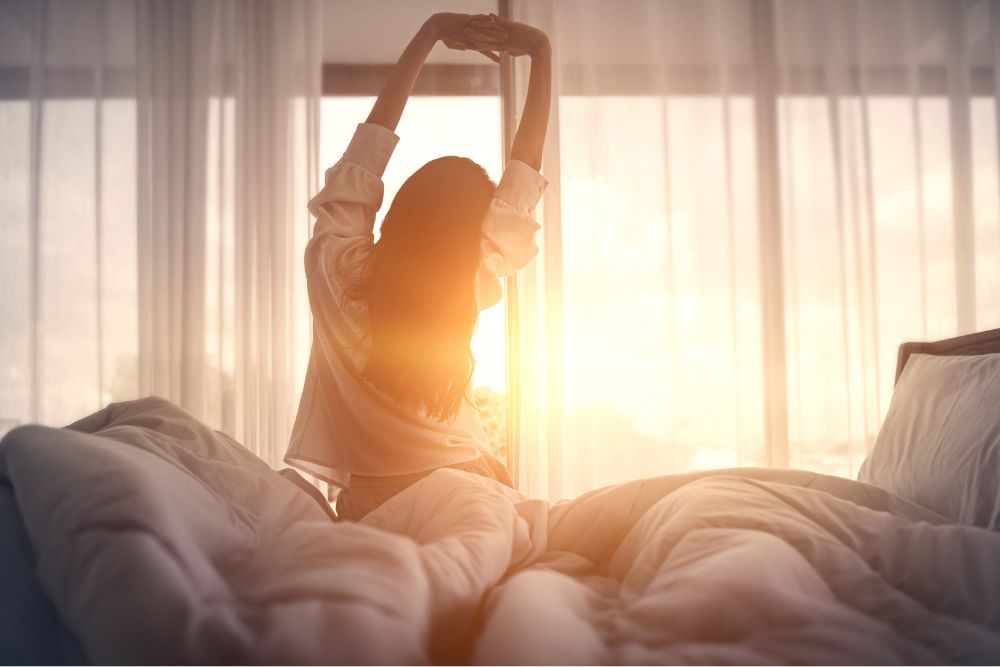Three interrelated areas in your life can provide ongoing support to your recovery: good nutrition, regular exercise, and restful sleep.
In the first two cases—eating and exercising—it is easy to see how the choices we make lead to better or worse outcomes. More fruits and vegetables? Good. More candy bars and sodas? Bad. A 30-minute walk every day? Good. Replacing that walk with a multiple-hour binge of your favorite sitcom? Less good.
But it may seem as though getting restful sleep isn’t really about making good choices. After all, you go to bed—and you either fall asleep or you don’t. And that may seem totally out of your control. You’ve done your part by putting your head on the pillow and closing your eyes. What happens from that point can seem mysterious.
In reality, however, many of the choices we make—both during the day and at night—have an effect on our ability to get deep, restful sleep that supports our physical and mental health. Ideally, you want to be getting 7 to 9 hours of sleep on a consistent basis.
Let’s look at the ABCs of getting more Zzzs.
The Connection Between Sleep and Nutrition
We have noted that sleep and nutrition are both important to your recovery. Luckily, quality decisions about nutrition are sometimes also quality decisions in relation to getting enough sleep.
For example, think about your evening snack (note that we are not judging here; we enjoy an evening snack, too). If you eat something heavy or spicy or fatty or fried, there is a good chance you are setting yourself up for heartburn, which often disrupts sleep. So avoid those sorts of foods and choose a complex carbohydrate and some low-fat milk, cheese, or yogurt instead. Eating those sorts of foods in the evening supports your sleep rather than working against it.
And of course, you want to be aware of how much caffeine you are consuming. You might think that your 3 p.m. cup of coffee that helps you get to the end of the workday is unrelated to your sleep issues, but that might not be true at all. Sticking to beverages like decaf coffee or decaf/herbal tea in the afternoon can make a big difference in your ability to drift off in the evening. Laying off sugary sodas—many of which are high in caffeine—throughout the day can also be helpful practice.
The Connection Between Sleep and Exercise
You might be thinking that rigorous exercise naturally tires you out and so can help you get better sleep. But it turns out that rigorous exercise has a stimulating effect on our bodies, and so is better done in the earlier part of the day. Your evening physical routine might include some light stretching as part of your preparation for bed.
If your exercise routine gets you outdoors, so much the better. Sunlight helps regulate our circadian rhythms, so getting outside when the sun is shining is a helpful practice for getting to sleep when the moon is on the rise.
Getting good sleep can serve you well as you pursue your fitness goals—another example of how the choices we make each day are interrelated.
The Connection Between Routine and Sleep
Establishing a nighttime routine will help you get into the proper mindset for sleep. Setting a regular bedtime is an excellent first step. If you know what time you need to go to bed to ensure you get at least seven hours of sleep, you are on your way to establishing practices to help you reach your goal.
For example, you might decide to set an alarm that reminds you that your bedtime is coming up. If that alarm goes off an hour before your chosen bedtime, you will have time to take a calming bath or shower, drink a cup of warm milk or herbal tea, do some stretching, or read a favorite book to help you wind down. The alarm can also serve as a good reminder that you should avoid screens before bed because the light from our televisions, computers, tablets, and phones has been shown to inhibit sleep.
In addition, your wake-up time should be as consistent as your bedtime. This can be hard to accept if you are used to sleeping in on the weekend, but big variations in our sleep patterns can upend the work we have done to ensure we get the rest we need. Make bedtime and wake-up time consistent seven days a week.
In addition, be judicious about napping during the day. A thirty-minute snooze might serve you well, but regularly taking lengthier naps is likely to undermine your overall sleep program. You want to avoid falling into a cycle in which you sleep during the day, which makes it hard to sleep at night, which leads to more daytime sleeping.
Cut Out Clutter, Tossing and Turning, and Sleep Aids
A tidy, cool, dark, comfortable environment serves your sleep goals well. So make sure the streetlights don’t shine in your window, your pillow is just how you like it, and the laundry isn’t piled up in front of the dresser.
If you find yourself tossing and turning, your best move may be to get up and enjoy a quiet activity (remember to avoid the screens) in low lighting. When you feel drowsy, return to bed.
And remember, sleep medication can be problematic—especially for those in recovery for a substance use disorder. Do not take medication for sleep without having an open and honest conversation with your physician.
Rest Easy: We’re Here to Help
At Bel Aire Recovery Center, we can help you identify and put into place strategies that will support your recovery. Contact us today to talk about our full continuum of treatment services.




